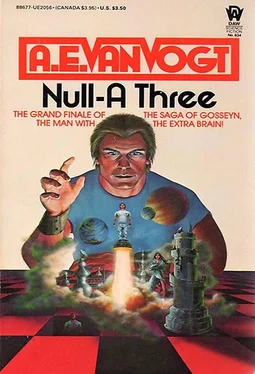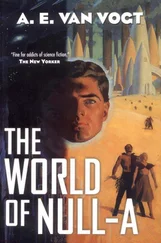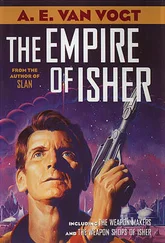Alfred Van Vogt - Null–A Three
Здесь есть возможность читать онлайн «Alfred Van Vogt - Null–A Three» весь текст электронной книги совершенно бесплатно (целиком полную версию без сокращений). В некоторых случаях можно слушать аудио, скачать через торрент в формате fb2 и присутствует краткое содержание. Жанр: Фантастика и фэнтези, на английском языке. Описание произведения, (предисловие) а так же отзывы посетителей доступны на портале библиотеки ЛибКат.
- Название:Null–A Three
- Автор:
- Жанр:
- Год:неизвестен
- ISBN:нет данных
- Рейтинг книги:3 / 5. Голосов: 1
-
Избранное:Добавить в избранное
- Отзывы:
-
Ваша оценка:
- 60
- 1
- 2
- 3
- 4
- 5
Null–A Three: краткое содержание, описание и аннотация
Предлагаем к чтению аннотацию, описание, краткое содержание или предисловие (зависит от того, что написал сам автор книги «Null–A Three»). Если вы не нашли необходимую информацию о книге — напишите в комментариях, мы постараемся отыскать её.
Null-A 3 is destined to become an instant classic — a mind boggling galaxy-spanning adventure!
Null–A Three — читать онлайн бесплатно полную книгу (весь текст) целиком
Ниже представлен текст книги, разбитый по страницам. Система сохранения места последней прочитанной страницы, позволяет с удобством читать онлайн бесплатно книгу «Null–A Three», без необходимости каждый раз заново искать на чём Вы остановились. Поставьте закладку, и сможете в любой момент перейти на страницу, на которой закончили чтение.
Интервал:
Закладка:
Then he relaxed back on the couch, his eyes pointing toward the ceiling.
There was a loud sound, then, off to his left. It was the sound of a man’s voice emitting a prolonged “Uhhhh!”
And then: “ Hey!”
That final yelling reaction came from the spokesman for the six persons, who had, all this time, been off there to one side. Gosseyn was able to make the identification because he had once more turned his head in that direction.
What he saw were the two men in civilian clothes. Both men were on their feet, and they were staring. It was, for them, a sideways look at the four chairs that, moments before, had been occupied by four uniformed, armed men.
All four gunholders had disappeared.
It was still not a good situation. A precaution, yes. But, despite his success in getting rid of the threat posed by the four gun holders, it was still far from being a normal condition for a human being.
His legs were tied as tightly as ever; the handcuffs that encased his wrists were of metal. And he was very much acceptant of responsibility for what had hap-
pened as a result of his arrival. Though he was not the original Gosseyn, nevertheless, he had made the decision to come here. As a consequence, Dan Lyttle and his little house were endangered. And so, Enin and he could not just take off in twenty-decimal fashion.
It was—Gosseyn realized ruefully—not exactly the ideal moment to state a basic purpose. Nonetheless, as he gazed up at Blayney, he spoke the great words:
“Why not,” he asked, “a return of honest government in the city of the games machine?”
CHAPTER 16
Silence!
Blayney stood there, looking down at the man he had evidently considered to be a prisoner, and not, so to speak, in name only.
Gosseyn, having stated his bottom line, a purpose so basic that anything else at this moment—words or action—would, it seemed to him, merely confuse the issue, consciously relaxed, and lay quiet.
It was the second of the two aides, who broke that silence. He spoke from the other side of the room, where the gun holders had been, and said in a deep baritone voice: “Sir, may we step over there, away from this Distorter area?”
Blayney’s expression, which had been essentially that of a non-plussed individual, became grim. He said, “I think we need a more basic solution.” He pointed down at Gosseyn. “Come over here, and carry this man outside.”
His eyes narrowed as he gazed down at Gosseyn. “Any objection?” he asked.
Despite his lying-down position, Gosseyn actually made a shrugging movement with his shoulders. “I see no point to it,” he said. He added, “I simply wanted to ask you that one question without being in danger of getting a violent reply.”
He shrugged again. “What about it?”
Once more it was Civilian Number Two who spoke first. “What about—” the man waved vaguely towards the empty chairs—“our guys? Shouldn’t he, uh, produce them?”
Blayney, who had half-turned toward the speaker, glanced back at Gosseyn. “What about them?” he asked.
Gosseyn said, “They’re not dead. But—” he added—“they’re not on this planet.”
“I’ve been trying,” said Blayney, “to guess where the Distorter would be located that could whisk them away. Because—” the man sounded both puzzled and impressed—“it must have taken some fine focussing to leave the chairs behind.”
For Gosseyn, it had been a relieving interchange; for it was now obvious that Blayney knew nothing of the ability of his extra-brain, and merely believed that a hidden machine had done the nefarious deed.
It seemed important to encourage that belief. So he commented in an even voice, “As you probably know, the interstellar contact brought a lot of scientific refinement to our little planet, along with the dangers and threats.”
The Head of the Government of what had once been the United States of America, nodded. “I suppose that’s a good way to put it.”
But he seemed to accept the explanation. Because, when he spoke again, it was more personal: “As for your question, let me repeat something I’ve already said.” The smile grew satirical. “Have you ever heard of political parties?”
“In what connection?”
“Well—” Tolerantly—“the upper echelon of a party is a gang of insiders. They occupy all the key positions.
There’s approximately eight hundred of them, and, prior to an election, they meet in that famous, smoke-filled back room that we’ve all heard about, where the language is four-letter words. Each one of them has his own smoke-filled room, with about two hundred cursing followers; and they all get jobs, also. The upper group are alter egos of the president, and if he does something they don’t like, they start yelling.”
Gosseyn said, “Give me the names of the inner group; and I’ll go and talk to them.”
If ever a man had an astonished expression on his face, it was Blayney at that moment. “Talk to them!” he said. “You out of your mind?”
“Well, not really talk.” Gosseyn did his own tolerant smile. “My real concern is to begin by re-establishing the Games Machine. Maybe you could treat that as a sort of an educational thing, or a museum, or better still, a way of getting the votes of the General Semantic nuts—you can call them that, unless you have a better four-letter word that will be more convincing to your cursing followers.”
“But why would you want to go and see some of these people?”
Gosseyn explained: “My interest is only in individuals who resist the re-establishment of the Institute of General Semantics, and, later on, the Games Machine.”
“But what would you do to them?” The man’s tone had an insistent quality. “Kill them?”
“No, I’ll just get rid of them, as I did your gunmen here.”
Long pause. Finally, reluctantly: “Well, I have to admit that you can rig up some pretty good disappearing equipment.” He broke off: “Where would you send them to?”
“I have a place in mind. But I think it would be better if you didn’t know where that was.”
Blayney must have beckoned. Because the civilian
Number One came over, untied Gosseyns legs, and unlocked the handcuffs. Gosseyn took them off himself, and handed them over.
As the aide stepped back, he addressed his “boss”; “Sir, may I ask this gentleman over here a question?” He indicated Dan Lyttle.
“Why not?” Blayney shrugged.
The aide thereupon said to Lyttle: “That assumption business you were telling the kid—is that for grownups, also?”
There was a faint smile on the lean face of the hotel clerk. “It’s for everybody. Why?”
“Listening to you,” was the reply, “I got to thinking, maybe I’ve got a few assumptions I could do without.”
Lyttle said, “Take a course in elementary General Semantics, like your, uh, boss here, did. Look where it got him.”
There was no reply. But a faraway expression in the man’s eyes indicated that a thought had come, and was staying.
Moments later, he was courteously opening the door for President Blayney’s departure.
… As Enin and he rounded the corner, Gosseyn had this body’s first direct glimpse of the Institute of General Semantics—or rather, of what was left of it.
What he saw was a building with a rectangular front that, except for its battered appearance, could have been what was left of an old-style bank building. Coming closer, Gosseyn saw that the look of being old was not just wear; it was tear.
Since he knew that the decorative facade had been forcibly removed, it was evident—as he gazed now—that the concrete, which had been below and behind the facade, had been damaged, also.
Читать дальшеИнтервал:
Закладка:
Похожие книги на «Null–A Three»
Представляем Вашему вниманию похожие книги на «Null–A Three» списком для выбора. Мы отобрали схожую по названию и смыслу литературу в надежде предоставить читателям больше вариантов отыскать новые, интересные, ещё непрочитанные произведения.
Обсуждение, отзывы о книге «Null–A Three» и просто собственные мнения читателей. Оставьте ваши комментарии, напишите, что Вы думаете о произведении, его смысле или главных героях. Укажите что конкретно понравилось, а что нет, и почему Вы так считаете.











